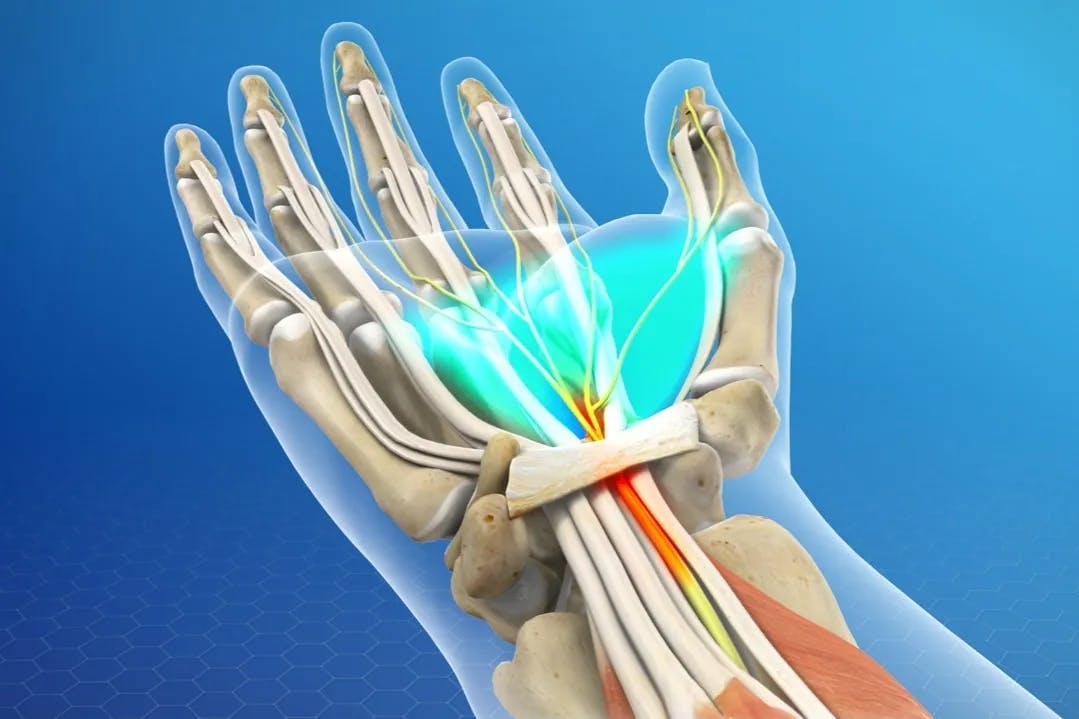.97077bf4.webp&w=640&q=75)
Carpal Tunnel Syndrome

Carpal tunnel syndrome is a common condition that affects the hands and wrists. It occurs when the median nerve, which runs from the forearm to the palm of the hand, becomes compressed or squeezed in the carpal tunnel. This can cause symptoms such as tingling, numbness, and weakness in the hand and fingers.Many people experience carpal tunnel syndrome as a result of repetitive hand and wrist movements, such as typing on a keyboard or using a mouse. It can also be caused by other factors, such as pregnancy, arthritis, or a medical condition that affects the hand or wrist.If left untreated, carpal tunnel syndrome can lead to permanent nerve damage and loss of hand function. That's why it's important to seek treatment as soon as possible.At our neurology clinic, we offer telehealth consultations with our experienced doctors. We use the latest technology to diagnose and treat carpal tunnel syndrome, so you can get relief from your symptoms and avoid further complications.Don't let carpal tunnel syndrome interfere with your daily activities and quality of life. Book an appointment online with us today and start your journey towards better hand health.
Frequently Asked Questions
What is Carpal tunnel syndrome?
Carpal tunnel syndrome is a condition that occurs when the median nerve, which runs from the forearm into the hand, becomes compressed or squeezed at the wrist. This can cause symptoms such as numbness, tingling, and weakness in the hand and fingers.
What are the symptoms of Carpal tunnel syndrome?
The most common symptoms of Carpal tunnel syndrome include numbness, tingling, and weakness in the hand and fingers. These symptoms are often worse at night and may also be accompanied by a burning sensation or pain that radiates up the arm.
How does one know they have Carpal tunnel syndrome?
If you are experiencing any of the symptoms described above, it is important to see a neurologist for a proper diagnosis. Your doctor will likely perform a physical exam and may also order imaging tests, such as an MRI or nerve conduction test, to determine if you have Carpal tunnel syndrome.
What are the most common treatments for Carpal tunnel syndrome?
The most common treatments for Carpal tunnel syndrome include non-surgical options such as wearing a wrist splint, taking anti-inflammatory medication, and avoiding activities that put pressure on the wrist. In more severe cases, surgery may be necessary to relieve the pressure on the median nerve.
Are there any risk factors for developing Carpal tunnel syndrome?
There are several factors that may increase your risk of developing Carpal tunnel syndrome, including repetitive hand movements, obesity, diabetes, and hormonal changes during pregnancy.
Can Carpal tunnel syndrome be prevented?
While it is not always possible to prevent Carpal tunnel syndrome, there are some steps you can take to reduce your risk. These include:
Taking frequent breaks from repetitive hand movements
Maintaining a healthy weight
Practicing good posture when using your hands
Can Carpal tunnel syndrome lead to more serious health problems?
If left untreated, Carpal tunnel syndrome can lead to permanent nerve damage and loss of hand function. This is why it is important to seek treatment as soon as possible if you suspect you may have the condition.
Can Carpal tunnel syndrome be treated with physical therapy?
Physical and occupational therapy can be an effective treatment for Carpal tunnel syndrome, as it can help to improve flexibility and strength in the wrist and hand. Your doctor or physical therapist can provide specific exercises to help alleviate symptoms and prevent the condition from worsening.
Is there a cure for Carpal tunnel syndrome?
The condition can usually be successfully treated with non-surgical options such as wrist splints and medication. In more severe cases, surgery may be necessary to relieve the pressure on the median nerve, which can cure it and prevent permanent damage.
Are there any alternative treatments for Carpal tunnel syndrome?
In addition to traditional treatments such as wrist splints and medication, some patients may find relief from alternative therapies such as acupuncture or chiropractic care. It is important to discuss these options with your doctor to determine if they are right for you.